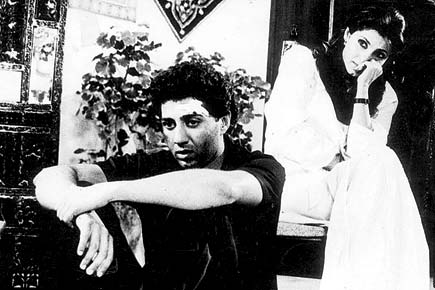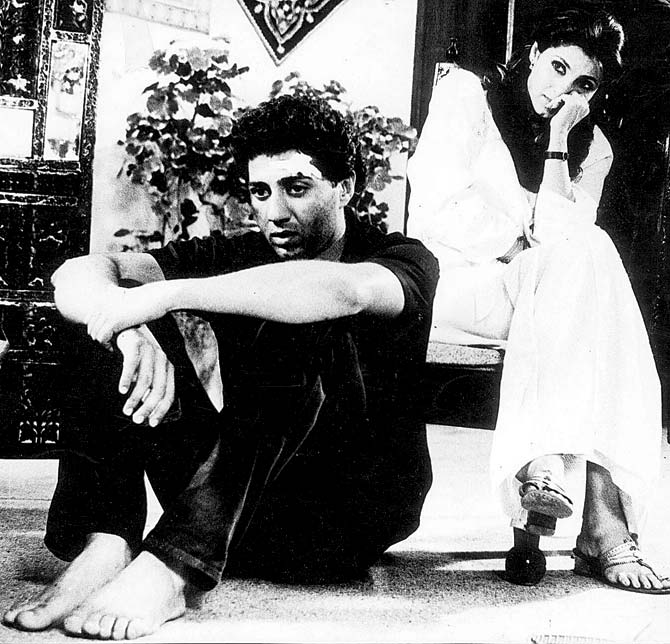This cult Sunny Deol film from over three decades ago is a must-watch


In Arjun, Sunny Deol essayed the role of an educated, unemployed young man
 The great Raj Kapoor used to love shooting in Pune. While he lived in the Chembur, the natural pathway to Pune, RK would board the Deccan Queen from Victoria Terminus instead, craving the special vada pao on the train.
The great Raj Kapoor used to love shooting in Pune. While he lived in the Chembur, the natural pathway to Pune, RK would board the Deccan Queen from Victoria Terminus instead, craving the special vada pao on the train.
ADVERTISEMENT
On one such occasion, Rahul Rawail (who'd been RK's assistant on Mera Naam Joker since he was 15) was on VT's by-lanes waiting for the train in the monsoons, when he chanced upon a rare sight - a sea of men under black umbrellas standing outside the restaurant Pancham Puri. From a certain angle, he could see no faces - only umbrellas.
That moment stayed with him. You see this stunningly recreated in the iconic rain-chase sequence in Rawail's cult film Arjun (1985) as goons track down an unarmed youth-all of them navigating through black umbrellas on a packed Bombay street, captured in top angle shots. You can't see people holding those umbrellas. Only swords show up in the tiny crevices between the jostling public. It's one of my favourite scenes in Bollywood. As is the film Arjun itself, with Sunny Deol as the educated, unemployed young man, accidentally rising up ranks in the local Mafia, caught in a crossfire between two warring politicians (Prem Chopra, Anupam Kher) from the same party.
Seen in the context of the generally despicable '80s Bollywood, which was either about (Subhash) Ghai, or 'thunder thighs', Arjun appears as that solid bridge between Salim-Javed action-dramas of the '70s, and gritty underworld films like Ram Gopal Varma's Satya (1998) in the following decade. Even Javed Akhtar, who wrote Arjun, attempting to fire up again Amitabh Bachchan's urban 'Angry Young Man', finds the film highly under-rated.
What I find fascinating-chatting in-depth, about Arjun, with Rawail, before a live audience at the Jagran Film Festival in Meerut-is that the film was simply a result of a song 'Mamaiya Kero Kero Mama' that RD Burman had composed for the filmmaker. The producer was on-board. Rishi Kapoor, Rawail's kindergarten buddy, was to play the lead. Except, it'd been a month, and Rawail and Akhtar, together in Lonavla, were unable to crack a script. They decided to give the process a break, and regroup a month later.
The night before they were to leave, Akhtar knocked on Rawail's room around 1.30 am. The script had visited him as he lay in bed, chiefly inspired by a newspaper article he'd read that day on young recruits of the nascent Bombay underworld.
He narrated the entire story (with jottings on tissue paper, lamp shade), right from the movie's first scene-of the hero being wheeled out of an ambulance - which is roughly also its last. Rawail was stunned. Akhtar admitted the script lacked "kahaniyat" (formulaic Bollywood structure). Of course, they'd have to do away with Rishi Kapoor.
If the producer backed off, both agreed, they'd just produce the film themselves. The track 'Kero Mama', choreographed as a dance-action sequence, with men fighting with rods and hockey sticks, obviously inspired by the musical West Side Story, remains a landmark moment in itself.
While Mr India (1987) is Salim-Javed's last film credited as a duo, the two had formally split after Shakti (1982). They followed their independent screenwriting careers thence. Rawail is possibly the only director who's worked with both of them separately.
Akhtar also wrote Sunny Deol's debut Betaab (1983) for him. And Dacait (1987), with Deol starring as the young Arjun again-within the rural jungle-law- which Rawail considers his best work. In my books, Rawail's best (after Arjun, perhaps) has got to be the incredibly funny Biwi O Biwi (1981), scripted by Guru Dutt's star-writer Abrar Alvi. Rawail collaborated with Salim Khan on Mast Kalandar (1991).
In a good position to comment on how Hindi cinema's most popular writers were different from each other, Rawail says, Javed was a dialogue meister, while Salim knew how to milk a moment-implying perhaps that the latter gave the script shape, and the former lent it poetic depth.
Besides introducing Kumar Gaurav, who's now a metaphor for a 'one hit wonder' in Love Story (1982), where Rawail was not credited as the director-because of issues with producer Rajendra Kumar - Rawail also filmed both Kajol (Bekhudi) and Aishwarya Rai's (Ao Pyar Ho Gaya) Bollywood debuts. The actor who debuted with Arjun, by the way, was Paresh Rawal.
Recommended by producer Karim Morani, Rawail met theatre actor Rawal on Arjun's set at Rajkamal Studio. No screen-test/audition, within a couple of hours Rawal was already before the camera, playing the politician's chief henchman's part.
He added much to the movie's gritty realism. So does the broad day-light murder scene (Arjun killing his friend's assassin) that Rawail remembers he shot with eight cameras placed at Flora Fountain, on a regular day, to capture the actual crowd's reaction.
Looking at 126 separate shots of the brilliant scene on the edit, Rawail's mentor Raj Kapoor told him there were seven cameras. The genius was right. One had conked off!
Mayank Shekhar attempts to make sense of mass culture. He tweets @mayankw14. Send your feedback to mailbag@mid-day.com
 Subscribe today by clicking the link and stay updated with the latest news!" Click here!
Subscribe today by clicking the link and stay updated with the latest news!" Click here!







